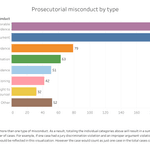
An analysis by the Death Penalty Information Center has discovered rampant prosecutorial misconduct in death penalty prosecutions. DPIC’s ongoing review of death sentences imposed and overturned after the U.S. Supreme Court struck down existing death penalty statutes in 1972 has identified more than 550 prosecutorial misconduct reversals and exonerations in capital cases (click to enlarge image). That amounts to more than 5.6% of all death sentences imposed in the United States in the past half-century.
“The data on wrongful convictions has long shown that prosecutorial misconduct is a significant source of injustice in the criminal legal system,” DPIC executive director Robert Dunham said. “But this research documents that what some judges have described as an ‘epidemic’ of misconduct is even more pervasive than we had imagined.”
These cases, Dunham cautioned, provide only a glimpse into the extent misconduct infects death penalty prosecutions. The list does not include the even more numerous cases in which courts found that prosecutors had committed misconduct but excused it on grounds of supposed immateriality or harmless error. It also does not include misconduct reversals in cases in which capital charges had been pursued but defendants were convicted of lesser charges or sentenced to life or less.
DPIC reviewed existing studies of prosecutorial misconduct, DPIC’s Exoneration Database, case documents from research for DPIC’s Death Penalty Census, and thousands of appellate opinions to identify capital cases that have been reversed for prosecutorial misconduct or resulted in a misconduct exoneration. This review demonstrated the widespread nature of the problem, uncovering misconduct reversals and exonerations in 228 counties, 32 states, and in federal capital prosecutions.
DPIC’s analysis uncovered a wide spectrum of misconduct leading to reversal. DPIC classified misconduct reversals into seven prevalent categories and a catchall category of “other” that encompasses a number of less common types of misconduct. DPIC distinguished between reversals and exonerations based on withholding favorable evidence; jury discrimination; improper argument; improper questioning; false evidence; improper evidence; and violations of the right to counsel.

DPIC found the most common types of misconduct were withholding favorable evidence (implicated in 35% of the reversed convictions or sentences) and improper argument (present in 33% of reversed sentences). 16% of the misconduct reversals or exonerations involved more than one category of misconduct.
Prosecutorial misconduct was present in 121 cases that led to a death-row exoneration. The misconduct often spanned multiple trial proceedings, including the case of Mississippi death-row survivor Curtis Flowers, who had four different convictions and death sentences overturned because of prosecutorial misconduct before he eventually was exonerated. The prevalence of misconduct in exonerees’ cases supports the findings of DPIC’s 2021 Special Report: The Innocence Epidemic, which documented that 69% of death-row exonerations have included official misconduct.
Death Penalty Information Center, Prosecutorial Accountability, posted June 30, 2022.
You can find the list of misconduct cases here.
